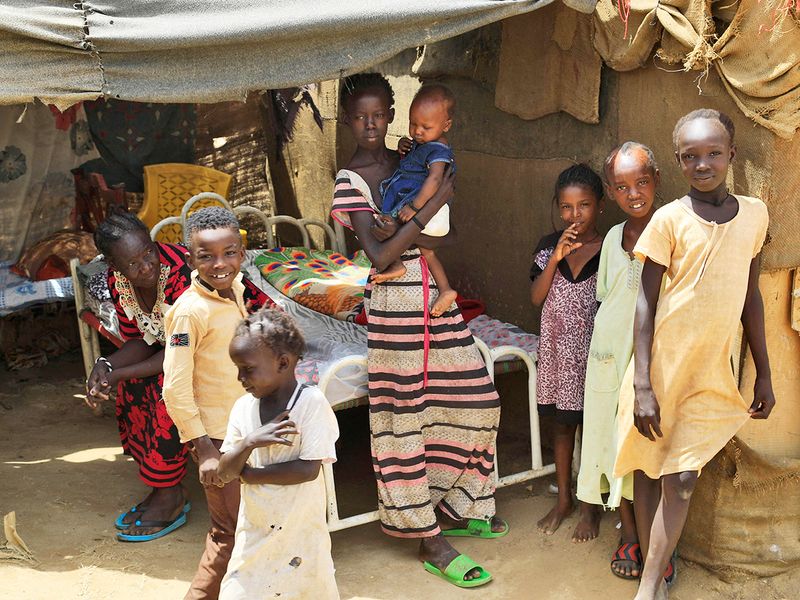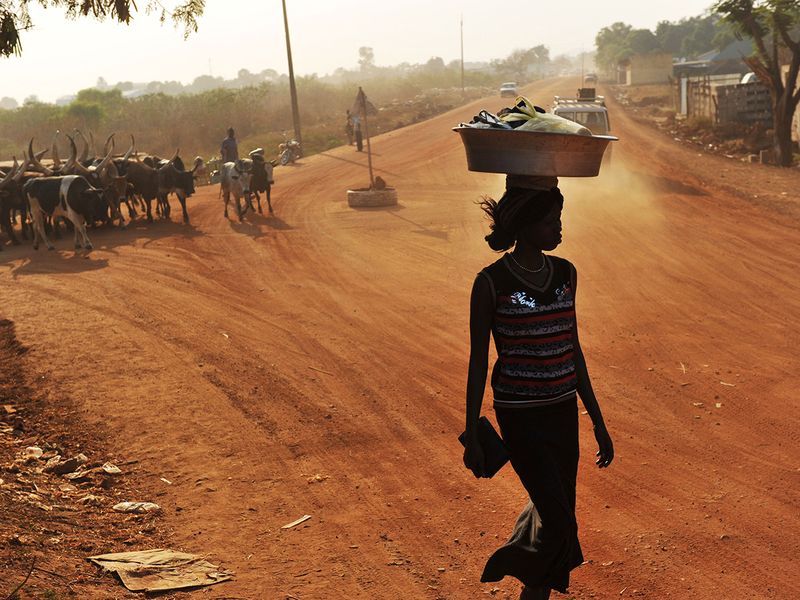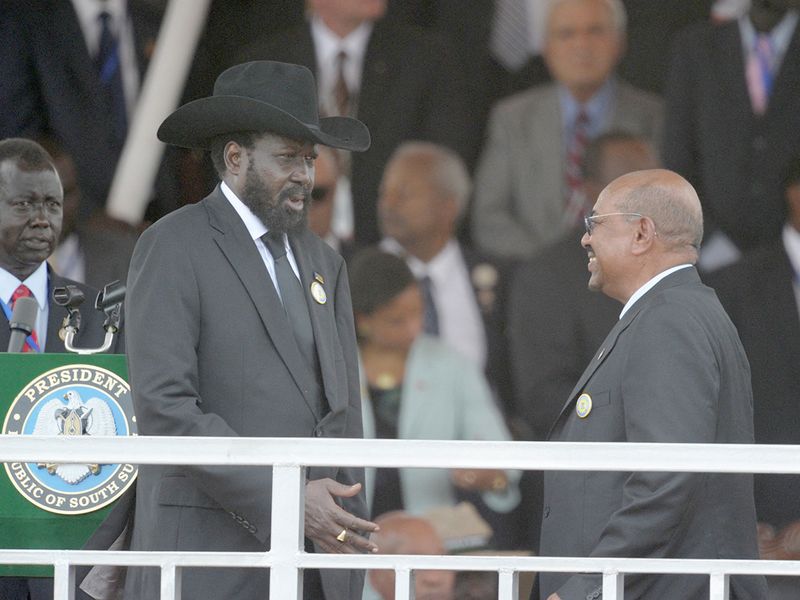Paris: South Sudan, which marks a decade of independence on Friday, is the world's youngest country and also one of the poorest, crippled by a devastating civil war that has left tens of thousands of people dead.
World's youngest state
South Sudan proclaimed its independence from Sudan in July 2011 following a referendum that saw nearly 99 percent vote in favour of secession.
The vote followed two civil wars that pitted rebels in the mainly Christian and animist south of Sudan against the Arab-dominated government in Khartoum. Millions of people died.
More than 380,000 people have died in the latest war, half due to illness and lack of access to healthcare.
A peace accord was signed in 2005 by the government and southern rebels. It exempted the south from Islamic sharia law and granted it six years of self-rule ahead of the referendum on independence.
Salva Kiir was sworn in as the country's first president with Riek Machar as his deputy.

Another civil war
Kiir and Machar were on the same side in the push for independence from Khartoum but ethnic and political rivalries drove them apart.
Tensions spiked when Machar - from the country's second-largest ethnic group, the Nuer - was fired as vice president in 2013.
Kiir, from the majority Dinka people, later accused him of mounting a failed coup.
By December 2013 the country had descended into civil war marked by ethnic massacres, widespread rape, the recruitment of child soldiers and other forms of brutality.
Under a 2015 peace deal, Machar was reinstalled as vice president. But fighting broke out again and he and his forces fled.
The two foes met in June 2018 and a new peace agreement was agreed in September with the aim of setting up a government of national unity. It was twice postponed.
More than 380,000 people have died in the latest war, half due to illness and lack of access to healthcare.
About four million have been forced from their homes.
The United Nations has accused government forces and other armed groups of having "deliberately starved" civilians by denying aid access and displacing communities.
Continuing violence has made South Sudan one of the most dangerous countries in the world for aid workers, with four killed in the last month.
Poverty and locusts
Four out of five of South Sudan's 11 million people live in "absolute poverty", according to the World Bank in 2018.
More than 60 percent of the population face severe hunger from the combined effects of war, drought and floods.
Adding to their woes, swarms of desert locusts have repeatedly plagued the country.
Such dire circumstance put South Sudan 185 out of 189 countries in the UN's Human Development Index.

Economy in ruins
Oil production - from which South Sudan brought in 98 percent of its revenues at independence - accounts for almost all of its exports and more than 40 per cent of GNP, according to the World Bank.
Since the 2018 peace agreement, crude oil production has risen back to almost half of what it was before the war.
While GDP growth was predicted to soar to 7.9 percent last year, the coronavirus and ongoing instability slowed that, though inflation has fallen back sharply from its 2019 peak of 170 percent.
South Sudan is also hobbled by corruption, according to Transparency International, ranking 178 out of 180 on its index.
Swamp and savannah
South Sudan is home to a rich variety of wildlife, including antelopes, elephants, giraffes and lions, and the largest savannah ecosystem in the East Africa region.
A vast area known as the Sudd is the largest swampy region in the world and home to hundreds of species of birds and swathes of papyrus fields and aquatic plants.
South Sudan's bloody first 10 years
As South Sudan marks 10 years of independence on July 9, we look back at the world's youngest country's bloody first decade, marred by a civil war that claimed 380,000 lives.

- 2011: New nation
On July 9, South Sudan proclaims itself independent from Sudan following six years of autonomy and two decades of war.
The president is Salva Kiir, with Riek Machar as his deputy. From different ethnic groups, the rivals also led the Sudan People's Liberation Movement (SPLM) that spearheaded the push for independence.
The new South Sudan takes over three-quarters of the oil reserves of the old Sudan while Khartoum retains control of all pipeline and export facilities.
Other thorny issues are the tracing of the new border and the status of disputed regions such as oil-rich Abyei.
- 2012: Oil clashes
The countries clash between March and May over rights to the oil fields around Heglig, a town just inside Sudan.
South Sudanese troops briefly occupy the area, which accounts for half of Sudan's crude oil production.
Arguments erupt over pipeline transit costs and Sudan confiscates millions of barrels of South Sudan crude.
South Sudan halts its production in January for more than a year, accusing Khartoum of theft.
- 2013: Civil war
Kiir fires Machar and all government ministers, their deputies and several police brigadiers on July 23.
Machar later accuses him of "dictatorial" behaviour.
After a night of fighting in the capital Juba, Kiir says on December 16 his forces had thwarted an attempted coup by Machar, who denies the claim.
Rival army units clash in Juba. The fighting spreads beyond the capital, fuelled by rivalries between Kiir's Dinka group and Machar's Nuer.
It sets off tit-for-tat massacres that turn into six years of war.
- 2016: Leader in exile
Machar and Kiir sign a peace accord in August 2015 that provides for Machar's reappointment as vice president.
He returns to Juba and is sworn in on April 26, 2016.
But fighting between supporters of both leaders breaks out again in July. Machar goes into exile, accusing Kiir of trying to have him killed.
- 2018: Peace deal
Kiir and Machar meet for the first time in two years on June 20.
On September 12 they sign a new peace agreement to end a war that has killed more than 380,000 people and displaced roughly four million.
It paves the way for a power-sharing government which is eventually installed in March 2020, with Machar again vice president.
- 2020: Slow progress
However, the armed conflict continues.
The UN several times extends its peace mission, as well as an arms embargo.
In June 2020 Kiir and Machar agree on control of the country's 10 states, the main remaining sticking point.
- 2021: UN warning
A UN report in April warns that the slow pace of implementing the peace accord risks a relapse into "large-scale conflict".
On May 8, after a delay of more than a year, Kiir includes opposition lawmakers in a new parliament.
A final drafting of a constitution begins on May 25.
Other points of the peace accord, such as the formation of a unified national army, remain to be resolved.
from World,Europe,Asia,India,Pakistan,Philipines,Oceania,Americas,Africa Feed https://ift.tt/3hNJJfG
No comments:
Post a Comment